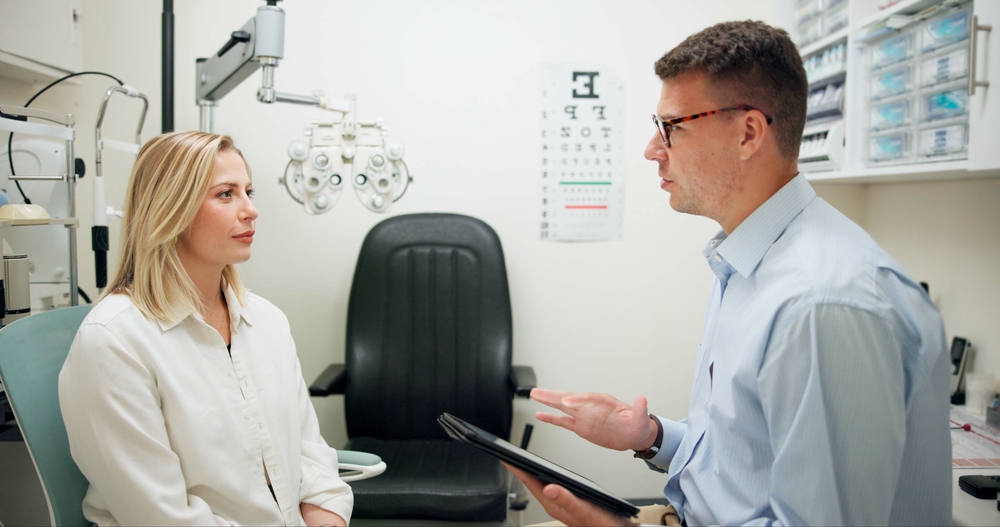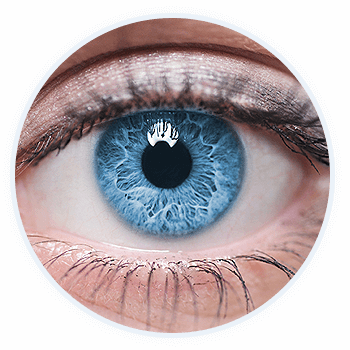
Keratoconus is an eye condition that causes the cornea, which is the clear, dome-shaped surface at the front of your eye, to gradually thin, weaken, and bulge outward into a cone-like shape.
Your cornea plays a crucial role in focusing light onto the retina so you can see clearly. When it becomes cone-shaped, light can no longer focus properly, leading to blurred or distorted vision.
Beyond vision changes, the major concern with keratoconus is that the cornea’s structure and integrity become compromised, making it unstable over time.
Not every patient with keratoconus will require surgery. Many people can manage the condition with treatments that strengthen the cornea and improve vision, but in advanced cases, a transplant may be necessary.
Keep reading to learn how keratoconus progresses, the treatment options available, and when a corneal transplant may be recommended!
How Fast Does Keratoconus Progress?
One of the first questions patients ask is how fast their condition will progress. The truth is, keratoconus affects everyone differently.
Most people see the biggest changes during their teens and twenties, when the eye is still growing and changing. By the time they reach their thirties, keratoconus often slows down significantly and in many cases stabilizes.
Some patients notice gradual changes over several years, while others might have times where their vision seems stable, followed by times when it changes more quickly. Certain factors can speed up progression, including frequent eye rubbing, untreated allergies, and family history of the condition.
This is why it’s important to schedule regular check-ups every 3-6 months in the early stages or while progression is suspected. The doctors at VisionPoint Eye Center use the latest and best technology to closely monitor your cornea’s shape and thickness. By catching even small changes early, they can tailor your treatment plan to protect your vision.
What Symptoms Should I Be Watching For?
Keratoconus symptoms can be subtle at first and are often mistaken for needing a stronger glasses prescription.
You might notice that your vision seems to change frequently, requiring new glasses or contact lenses more often than usual. Reading becomes harder, and you may find yourself squinting more to see clearly. Many patients describe their vision as “smeared” or say that lights look like they have halos or streaks around them, especially at night.
Contact lens wearers often notice their lenses don’t fit as comfortably as they used to, or they pop out more easily. You might also become more sensitive to bright lights or find that your eyes feel tired more quickly than before.
If you’re experiencing any of these symptoms, it’s worth having an eye health exam. Early detection makes a significant difference in managing keratoconus effectively.
What Treatment Options Are Available Before Surgery?
Most patients with keratoconus don’t need surgery, especially when doctors catch the condition early. Several effective treatments can improve your vision and potentially slow progression.
Specialty contact lenses are often the first line of treatment. These aren’t typical soft contacts. They’re designed specifically for the irregular shape of a keratoconic cornea.
Options include rigid gas permeable lenses, hybrid lenses (hard center with soft edges), or scleral lenses that vault over the cornea entirely.
For patients whose keratoconus is still progressing, doctors may recommend corneal cross-linking. This procedure strengthens the corneal tissue using riboflavin (vitamin B2) drops and UV light. It’s an outpatient procedure that can help prevent further shape changes.
The key is working with your eye doctor to find the right combination of treatments for your specific situation. Most patients achieve good functional vision with these non-surgical options.
Are you experiencing changes in your vision or suspect you might have keratoconus? Schedule an appointment at VisionPoint Eye Center in Bloomington, IL, today!











